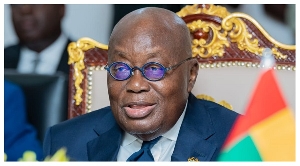Politics of Friday, 19 December 2014
Source: starrfmonline.com
Don’t rush into electing MMDCEs – Fullbright Law Prof warns Ghana
An American Constitutional Law Professor has cautioned Ghana against rushing into passing a law that requires that District, Municipal and Metropolitan Chief Executives (MMDCEs) get elected rather than appointed.
Currently, all MMDCEs are appointed by the President of Ghana.
“I do think …one ought to think about it very carefully because it does pose a risk of a different deadlock from the kind of deadlock between two political parties at the centre, namely deadlock between the Centre and local governments,” Prof Griffiths warned when he spoke at a public forum organised by the Institute of Democratic Governance (IDEG) on the “role of constitutional reforms in consolidating peace, stability and national cohesion”.
Various groups, including the Coalition for the Election of DCEs (CED) as well as the Institute of Economic Affairs (IEA), Progressive People’s Party (PPP) and its Founder Dr Papa Kwesi Nduom have been ardent campaigners for the election of MMDCEs.
At a Constitutional Review series held in August 2013 under the theme “rethinking Ghana’s winner-takes all system,” the IEA noted that “there should be effective and truly decentralised local governance.”
The Constitution Review Commission (CRC) set up in 2010 by President John Mills (late) to oversee the amendment process of the country’s 1992 Constitution came up with some recommendations in connection with the election and selection of MMDCEs.
There are six metropolitan assemblies, 48 municipal assemblies and 162 district assemblies in Ghana currently.
The CRC recommended three different processes in settling on Chief Executives for all three categories of local government leaders.
It said there would be one approach for the selection of the chief executives for the six metropolitan assemblies, a different methodology for the 48 municipal assemblies and yet a different method for the 162 district assemblies.
“For the six metropolitan assemblies, the CRC recommended that: “the metropolitan chief executives should be popularly elected”, a statement from the Ministry of Local Government and Rural Development, signed by the sector Minister at the time, Mr Akwasi Opong-Fosu, clarified in March last year.
This means, for example, that for the whole of Accra Metropolis, covering the entire jurisdiction of the Accra Metropolitan Assembly, there would be an election open to every eligible contestant to stand as the metropolitan chief executive and all eligible voters would have the opportunity to vote and elect one candidate.
“In short, this recommendation was for a pure political process,” the statement said.
It noted that in the case of the 48 municipal assemblies, it was the recommendation of the CRC that: “the President should nominate persons who would be vetted by the Public Services Commission (PSC) for competence, after which three nominees would contest in a public election”.
It said this proposal combined the legitimacy of a political process with an administrative/bureaucratic system.
The statement held that the CRC’s recommendation for the 162 district assemblies was that: “the President should nominate a candidate for approval by a simple majority of the assembly as DCEs”.
It said this recommendation was very close to the system which pertained.
“The key difference between the CRC’s proposal and the current situation is that at present, the approval of a DCE requires two-thirds majority of the assembly.
“Critically examined, the three proposals above mean that the emergence of chief executives was going to flow from an amalgam of processes.”
The statement said the government had decided to adopt a uniform and pragmatic method for the emergence of chief executives for all categories of assemblies.
It said it was the view of the government that in “decentralising in a unitary state, a delicate balance ought to be struck between central control and local autonomy”.
It said the final decision was that “Article 243(1) of the 1992 Constitution should be amended for the President to nominate a minimum of five persons who would be vetted by the PSC for competence after which three of them would contest in a public election”.
The statement said the proposal would apply to all categories of assemblies and that the next step in the process was for Parliament to go through the proper procedures to carry out the amendment.
It maintained that until then, the status quo remained and expressed the hope that the explanation would bring some clarity to the issue of selecting DCEs.










